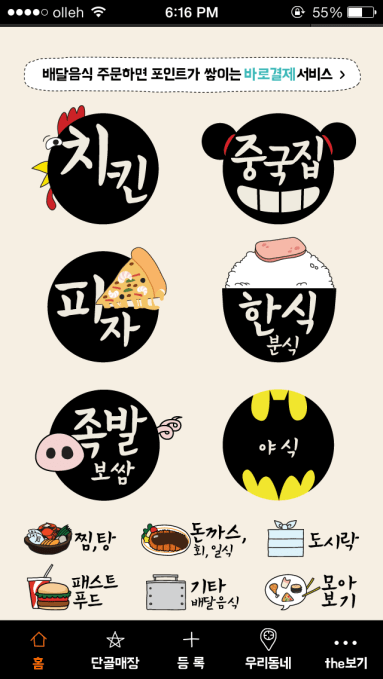South Korea is no stranger to controversy over its Internet policies. The country still mandates virus protection and security measures that essentially require the use of Internet Explorer and Windows, and the government has one of the most aggressive Internet policing bureaucracies in the democratic world. The Economist has called the country an “Internet dinosaur” despite its world-leading mobile and bandwidth penetration rates. Yet, a recent controversy over food-delivery apps here has all the ingredients for a wider discussion over the cost of technological progress in this highly connected country.
Every city has its vices, and in Seoul, one of those vices is late-night fried chicken delivery. In residential neighborhoods here, dozens of fried chicken stores compete for the late-night snack crowd, offering a bountiful array of chicken options (my favorite is the “snowing chicken” – deep-fried chicken covered in sprinkled cheese). Chicken is always ready to be delivered, with 24/7 availability at a number of stores, and delivery reliably comes straight to your apartment door in 30 minutes or so, bundled with a bottle of soda and side dishes all for about $20.
Until recently though, ordering chicken was cumbersome. Many of the chicken stores are independently owned franchises, without an easy-to-access website. Discovering new restaurants usually meant walking down the street and writing down contact information, or being aggressively shoved an advertisement by a stern-looking Korean mother who will not take no for an answer.
That has started to change over the past few years as a host of new apps have cropped up that promise to simplify food delivery while making it easier for owners to manage their stores. These apps follow what might be called the Uber model – make the product instantly available using a smartphone without requiring a phone number or searching the web, and handle all the transaction details for the customer. Given the numerous food establishments already available, these apps try to build a discovery experience similar to Yelp, while also assisting in the logistics of actually ordering the food and getting it to your door.
The most popular app in this category is “Baedal Minjok,” which loosely translates to the “delivery people” (and also doubles as a pun, since the phrase has a classical meaning of “the Korean race”). According to its Google Play entry, the app is currently installed on 5 million-10 million devices, which would be about 10–20 percent of Korea’s population, an astounding rate of growth for the three-year-old app.

The app is charming and playful, as the screenshots show. The cartoon-inspired user interface is quite enjoyable to play with, but its amusing personality belies a very comprehensive and satisfying buying experience. Most stores have an online menu complete with photos as well as reviews from other customers. When users are ready to make a selection, the app provides a button to call the store, or if the merchant subscribes to the service, an instant ordering feature to deliver it to an address without hassle. Needless to say, it nails its target demographic.
Yet, the success of the app has come under increasing criticism from local store owners, who say the app’s fees are too high. BeSuccess, one of the most prominent local startup news sites in South Korea, has written several great Korean-language articles on the situation. Essentially, the debate is around how expensive the fees are, and whether stores can afford the scrapes that the app takes.
According to store owners, the company’s fee structure adds up to about a 12.5 percent scrape on every transaction. Calculating this is fairly difficult for all involved, because there are multiple fees, a monthly minimum fee, along with others that make an easy calculation impossible. The company has responded by saying that their fee structure is closer to 6.4 percent per order (Korean infographic), and that the fee declines quite rapidly with increasing order volume since the monthly subscription fees are then spread over more orders.
Small businesses in Korea face the same profitability issues as small businesses anywhere, and these issues are particularly acute given that such companies employ around four out of five people in the country. In talking with Koreans about the issue, they seem to be legitimately torn between helping small business owners and enjoying the convenience of instant ordering. Baedal Minjok lists phone numbers, and any user of the app can easily make a phone call to the store and order without any per-order fees applying. Yet, few customers seem interested.
The flare-up over food-delivery fees is only one part of the story of these apps and how they are changing the character of food here in Seoul. Before the advent of these tools, most stores operated in essentially micro-markets. For instance, my apartment building has about five delivery restaurants inside or within a few meters, and previously, few would have ventured out beyond a handful of very close options.
 But with these apps, customers suddenly have immediate knowledge of every store within a kilometer radius. Already, we are seeing a split between the most and least popular stores, with some of the more commonly reviewed stores receiving prominent billing, while others with fewer reviews are placed further down the rankings. Over time, such a system will tend to concentrate orders to a handful of winners, with other stores facing tougher odds of succeeding.
But with these apps, customers suddenly have immediate knowledge of every store within a kilometer radius. Already, we are seeing a split between the most and least popular stores, with some of the more commonly reviewed stores receiving prominent billing, while others with fewer reviews are placed further down the rankings. Over time, such a system will tend to concentrate orders to a handful of winners, with other stores facing tougher odds of succeeding.
Whether new policies will be introduced to protect the merchants remains to be seen. About two years ago, Korea instituted a new law requiring large supermarkets to be closed two Sundays each month, to improve the competitive position of small local markets. Similar policies could potentially be introduced in the restaurant category.
More realistically, small restaurant owners will have to adjust to a changing competitive landscape, and realize their location no longer assures them an adequate supply of customers. That will hopefully mean better chicken, like the delivery that just arrived at my door.
